«Поворот Пауэлла завершен»: золото, акции, биткоин и облигации растут, поскольку председатель ФРС говорит, что «пришло время для корректировки политики»
Резюме: Комментарии Пауэлла подтвердили, что сентябрьское снижение ставки наступает, поскольку, по его словам, «пришло время для корректировки политики», а трейдеры ищут ясности относительно величины снижения. Комментируя выступление, Ник «NIkileaks» из WSJ Тимирас сказал:Поворот Пауэлла завершен. и отмечает следующее:
Пауэлл — голубой по всем направлениям — с той же стадии, когда он два года назад дал понять, что ФРС примет рецессию как цену восстановления инфляции:
- "Охлаждение условий на рынке труда безошибочно. "
- "Кажется маловероятным, что в ближайшее время рынок труда станет источником повышенного инфляционного давления. "
- «Мы не стремимся и не приветствуем дальнейшее охлаждение условий на рынке труда. "
- «Настало время для корректировки политики. Направление движения ясно, и сроки и темпы снижения ставок будут зависеть от поступающих данных, меняющихся перспектив и баланса рисков. "
- «Мы сделаем все возможное для поддержки сильного рынка труда по мере дальнейшего продвижения к стабильности цен. "
Пауэлл рассказывает о причинах и поведении инфляции с 2020 года. Признавая, что не все согласятся с его формулировкой, он заключает:
- "" Это моя оценка событий. Ваш пробег может варьироваться. "
- Перечислив ряд суждений, которые заставили чиновников описывать инфляцию как, вероятно, временную, Пауэлл отмечает, насколько широко распространены эти взгляды за пределами ФРС:
- "" Хороший корабль Транзиторий был переполнен. "
На рынке труда председатель сказал:Мы не стремимся и не приветствуем дальнейшее охлаждение рынка труда». Это еще раз показывает важность отчета о занятости в США от 6 сентября, который, по-видимому, будет диктовать размер шага ФРС. Это может привести к уменьшению более чем на 25bps.
Пауэлл продолжил замечать, как внимание ФРС сместилось в рамках своего двойного мандата, поскольку он заявил, что баланс рисков для наших мандатов изменился, а риски роста инфляции уменьшились, риски снижения занятости увеличились. "
Наконец, Председатель вновь подтвердил зависимость от данных, отметив, что «сокращение темпов и темпов темпов будет зависеть от данных, перспектив, баланса рисков».
В ответ рынки увидели широкую голубиную реакцию с ростом казначейских облигаций и акций наряду с падением доллара. Обратите внимание, что цены на денежном рынке ФРС мало изменились с 32 б/с в сентябре и 97 б/с к концу года.
Посмотреть Пауэлл здесь:
Tl;dr: Пауэлл подтвердил, что было в FOMC Minutes
«Пришло время, чтобы политика приспособилась». Пауэлл сказал:
«Направление движения является четким, и сроки и темпы сокращения ставок будут зависеть от поступающих данных, меняющихся перспектив и баланса рисков. "
На рынке труда доминируют...
Мы не стремимся и не приветствуем дальнейшее охлаждение условий на рынке труда. Пауэлл сказал, добавив, что замедление на рынке труда было «безошибочным». "
Чего бы это ни стоило?
"" Мы сделаем все возможное, чтобы поддержать сильный рынок труда, поскольку мы делаем дальнейший прогресс в направлении ценовой стабильности. При соответствующем сдерживании политики есть веские основания полагать, что экономика вернется к 2-процентной инфляции при сохранении сильного рынка труда. Текущий уровень ставок дает нам достаточно возможностей для реагирования на любые риски, с которыми мы можем столкнуться, включая риск дальнейшего ослабления условий на рынке труда.""
Глава ФРС также признал недавний прогресс по инфляции, которая возобновила замедление в последние месяцы после остановки в начале года:
«Я уверен, что инфляция находится на устойчивом пути к 2%», — сказал он.
** **
Рынок оценивал сокращение на 30 б/с в сентябре перед выступлением Пауэлла. (и 97 б/с сокращений за 2024 год в общей сложности) Это больше, чем 25bps DOTS.
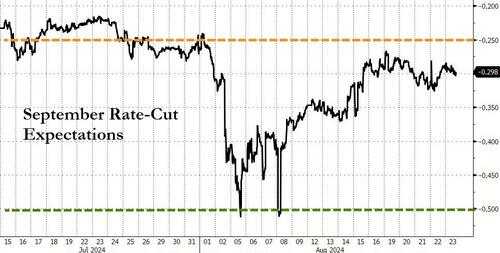
Он практически не изменился после комментариев...
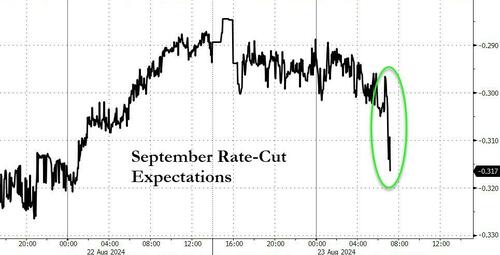
Но акции, золото и облигации - это все ставки на заголовки (и доллар сброшен).
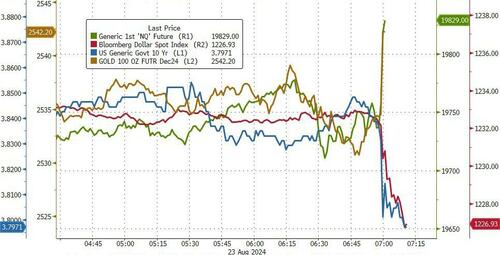
Биткойн также выходит из строя, обратно выше 62 долларов, поскольку вырисовывается короткое сжатие.
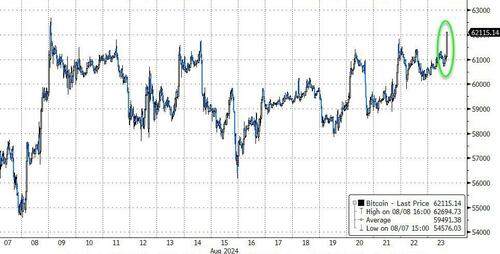
** **
Полные комментарии Пауэлла:
** **
Ранее...
Джером Пауэлл Джексон Хоул речь
Джексон Расписание Hole было опубликовано вчера вечером, объявив, что управляющий Norges Bank Ида Уолден Баче и управляющий Bank of Brazil Роберто Кампос Нето присоединятся к члену правления ЕЦБ Филиппу Лейну в субботней обзорной панели. И Вольдену Баче, и Кампосу Нето недавно пришлось уделить большое внимание колебаниям обменного курса при обсуждении передачи политики. Уолден Бах отодвинул некоторые усилия, чтобы побудить Norges Bank более жестко контролировать обменный курс, и утверждал, что гибкость валютного курса необходима для небольшой открытой экономики. Амортизация крон занимает видное место в модели NEMO Банка и является ключевой причиной, по которой они обязались удерживать ставки на стабильном уровне. Норгес также выразил некоторую обеспокоенность по поводу того, как различия в структурах рынка жилья могут повлиять на передачу денежно-кредитной политики. И недавно они пересмотрели свою оценку нейтральной ставки несколько выше, с акцентом на глобальные факторы. Кампо Нето также недавно обсудил структурные факторы, способствующие высокому нейтральному курсу в Бразилии, в панельной дискуссии в Синтре, многие из которых усугубились после Ковида, включая субсидируемый кредит, траекторию долга и изменения в производительности. Как правило, участники дискуссионной группы выступают с краткими речами в начале дискуссии до начала более широкой дискуссии.
Председатель Пауэлл выступит с речью об экономических перспективах в 10:00 по восточному времени, доступной через веб-трансляцию. Губернатор Бейли даст обеденный адрес в 3 часа дня по восточному времени. Тексты докладов и выступлений будут размещены на сайте в момент начала каждого мероприятия.
Различные Спикеры ФРС также будут давать интервью в течение дня - см. таблицу ниже для подборки того, что было объявлено до сих пор, времена могут быть не точными.
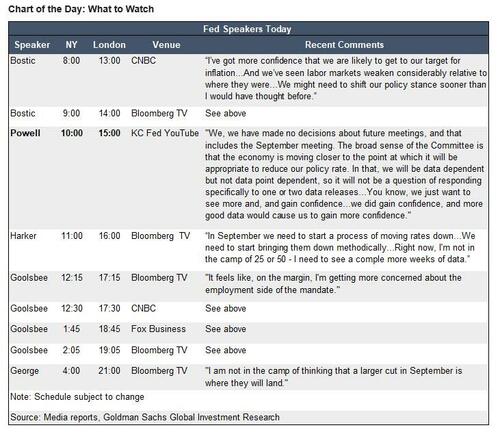
Вот график спикеров ФРС, который в настоящее время установлен:
- 8:00: ФРС говорит на CNBC
- 9 утра: ФРС говорит на телевидении Bloomberg
- 10:00: Пауэлл говорит об экономических перспективах
- 11:00: Харкер ФРС выступает на Bloomberg Television
- 12:30 вечера: Гулсби ФРС говорит на CNBC
- 1:45 вечера: Гулсби говорит о Fox Business
- 2:15 вечера: Гулсби ФРС на Bloomberg TV
Вчера Коллинз и Харкер дали боковые интервью Bloomberg, CNBC, MNI и Fox Business. Харкер отметил, что, по его мнению, ФРС «необходимо начать процесс снижения ставок» в сентябре, но ему нужно увидеть еще несколько недель данных, чтобы определить, подходит ли 25 или 50 баррелей в сутки. Коллинз также сказала, что она считает, что «скоро будет целесообразно начать политику смягчения», и повторила, что «данные скажут нам, какой темп имеет смысл». Мартинс Казакс из ЕЦБ также дал интервью вчера и сказал, что он будет «очень открыт для обсуждения еще одного снижения ставки в сентябре».
Американская экономическая команда Goldman ожидать Председатель Пауэлл выразил немного больше уверенности в перспективах инфляции и уделил немного больше внимания понижательным рискам на рынке труда, чем на своей пресс-конференции после июльского заседания FOMC. В свете данных, опубликованных с тех пор. Выступление в этом направлении согласуется с прогнозом наших экономистов о трех последовательных сокращениях на 25 б. п. в сентябре, ноябре и декабре.
При более внимательном рассмотрении того, что Пауэлл может сказать сегодня, основное внимание будет уделено любым намекам на предстоящий размер снижения ставки в сентябре, будь то 25 или 50 б/с. Вот некоторые мысли по этому вопросу от NewsSquawk:
Собрание руководителей центральных банков, ученых и политиков часто рассматривается как направление политики, с акцентом на любые обновленные оценки состояния экономики США и траектории денежно-кредитной политики. Пауэлл в прошлом месяце заявил, что если инфляция и рынок труда продолжат охлаждаться, снижение ставки может быть уместным на заседании FOMC 18 сентября. На этой встрече денежные рынки в настоящее время оценивают около 34 млрд. Это, по сути, говорит о том, что снижение ставки на 25 б/с полностью ожидаемо, с некоторой добавочной вероятностью ФРС может пойти на большее снижение на 50 б/с. В последние недели цены на голубей снизились, поскольку инфляция продолжает охлаждаться, а рынок труда продолжает выглядеть устойчивым на фоне замедления (в какой-то момент рынки полностью ожидали снижения ставки на 50 б/с несколько недель назад). Когда колебания роста подогревают опасения, что ФРС может оказаться за кривой. Пауэлла также, вероятно, спросят о размере снижения ставки. И трейдеры будут следить за тем, не отступит ли он от призывов к более крупному сокращению (когда его спросили об этом в июле). Пауэлл сказал, что ФРС сейчас не об этом думает. WSJ Наблюдатель ФРС Ник Тимирас заявил, что многие чиновники готовы начать снижение ставок на традиционный четвертьпроцентный пункт в следующем месяце, но не уверены, как быстро они должны пойти после этого. Данные по рынку труда за август могут склонить чашу весов в пользу более крупного сокращения, если оно будет столь же разочаровывающим, как и июльские чтения.
Темы:
Bank of America говорит, что есть шанс, что Пауэлл может выбрать прямое обновление, взяв аналогичную линию, которую он сделал на своей пресс-конференции после встречи в июле: сдвиг в языке от этого июльского сообщения может предположить, что комитет приближается или является дозой. рассмотрение мер по смягчению. Бофа сказал. Еще один сигнал может быть, если Пауэлл будет сильнее, говоря, что комитет хочет избежать неожиданной слабости на рынке труда, а не просто реагировать на нее после того, как она произойдет. Пауэлл мог бы сослаться на июньское Резюме экономических прогнозов, которое указывало на постепенное устранение политических уступок из-за экономической неопределенности. «Определение ФРС для достижения мягкой посадки возвращает инфляцию к целевому уровню, не требуя ухудшения условий на рынке труда», — говорит Бофа. Борьба с инфляцией не полностью выиграна, но сообщение может заключаться в том, что она была выиграна достаточно, где акцент теперь будет сделан на предотвращении нежелательной слабости на рынке труда. "
Маркет Реакция:
Между тем, аналитики Barclays отмечают некоторые опасения инвесторов по поводу того, что ФРС находится «за кривой», а баланс рисков теперь склоняется к мандату занятости. Barclays говорит, что инвесторы ищут больше ясности в отношении новой равновесной ставки и пути к этой ставке.
Самое главное, Джексон Hole стал более рыночным событием в новейшей истории, например, по активам среднее скорректированное движение в 2017-2022 годах было в 1,7 раза больше по сравнению с периодом 2010-2016 годов. Банк отмечает, что опционы S&P в настоящее время кажутся справедливыми, поскольку они оценивают движение на 75 б/с, в целом в соответствии с историческим ценообразованием (68 б/с) и средними реализованными движениями (72 б/с). Однако, глядя на вселенную из 35 ETF с ликвидными опционами и охватывающими четыре класса активов, опционы на ряд международных фондовых ETF (EM и EU equity) в настоящее время оцениваются в самых дешевых ходах по сравнению с историей.
Глядя на будущее сегодня утром, риск резко выше на ожиданиях голубиной речи Пауэлла. но Два года назад председатель ФРС удивил рынок, произнеся ястребиную речь, в которой S&P 500 упал на 3,4%, в то время как 10-летняя доходность выросла на 8 б/с в день.
Наконец, предостережение от Майкла Хартнетта из BofA (полное примечание здесь для профессиональных субмарин), который напоминает нам 5 из 6 Пауэлл Джексон В выступлениях Hole в течение следующих 3 месяцев S&P 500 упал в среднем на 7,5%.
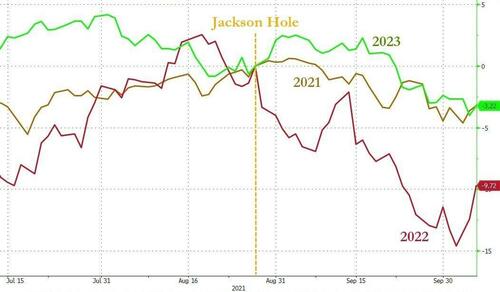
...И он спрашивает:Кто остался покупать? " с выделением частным клиентом BofA 62% (Chart 15) и наличными S&P 500 только 8,8% активов (Chart 4), часто медвежий наконечник
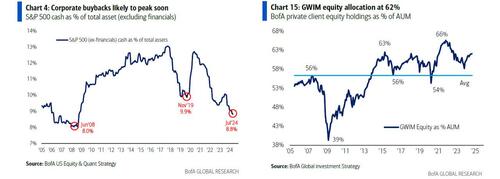
Для тех, кто ищет больше, вот еще один предварительный просмотр JHole от Rabobank, но вот ключевые моменты:
Стратег ФРС Rabobank недавно пересмотрел свой призыв с одного снижения ставки за квартал до четырех последовательных сокращений, начиная с сентября. Он считает, что рецессия должна начаться, если она еще не началась. Председатель ФРС Пауэлл может дать стартовый знак на сегодняшней конференции в Джексон-Хоуле, но он также может дать некоторые намеки на то, что рынок слишком агрессивно оценивает цикл смягчения. Конечно, есть ограничения для дальнейшего руководства Пауэлла, поскольку он не хочет переоценивать какой-либо конкретный результат в сентябре.
Так какая у него комната?
- Пауэлл может с уверенностью сказать, что инфляция устойчиво движется к 2%. FOMC еще не была готова изменить свое официальное заявление в июле, чтобы включить это сообщение, но Пауэлл, безусловно, был готов на пресс-конференции. Данные по инфляции с тех пор обнадеживают, поэтому Пауэлл может подтвердить, что его уверенность в дезинфляционном процессе улучшается.
- Между тем, Пауэлл может подчеркнуть слабость данных по рынку труда в качестве второго и более срочного аргумента в пользу снижения ставок. В июльском заявлении FOMC уже заявила, что внимательно относится к рискам для обеих сторон своего двойного мандата.
- Наконец, председатель ФРС может указать, является ли базовый уровень сокращением на 25 или 50 баррелей в сутки. Между речью Пауэлла и сентябрьским заседанием все еще будет опубликован полный набор данных, поэтому для него было бы преждевременно сигнализировать о точном размере предстоящего снижения ставки. Тем не менее, он может сигнализировать о том, что ФРС по-прежнему склоняется к сокращению на 25 миллиардов, а не на 50 миллиардов, как ожидают некоторые участники рынка. Например, Пауэлл может подчеркнуть, что он уверен в стабильности рынков и что он не верит, что ФРС находится за кривой.
Тайлер Дерден
Фри, 08/23/2024 - 09:22












